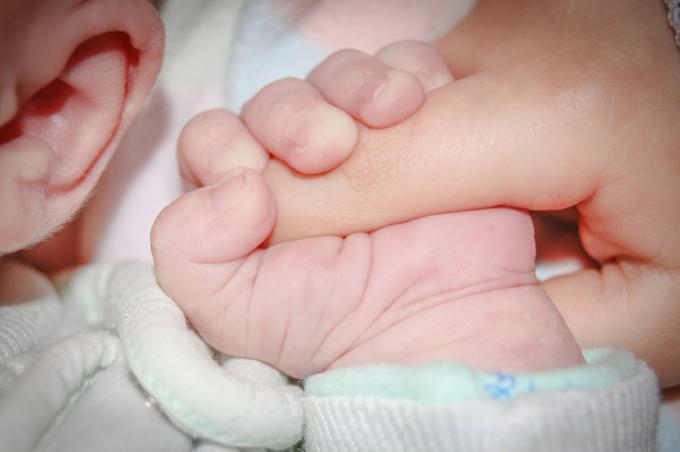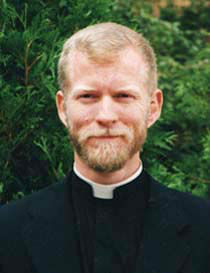
Culture
This approach seeks to set up a particular supportive environment within the hospital or another setting, in which all the members of the family can receive the child following delivery, hold and name the newborn, and fully acknowledge his or her brief but meaningful life.

Pacholczyk
During the course of pregnancy, receiving an adverse prenatal diagnosis can be a tremendously jolting experience for parents. In severe cases, physicians may tell them that their unborn child has a condition that is "incompatible with life."
While some children with this diagnosis may still receive helpful treatments and manage to live and even thrive for years, in other cases, no realistic treatment options exist and they may live only a matter of minutes or hours following their birth, particularly when they are born with severely damaged or missing vital organs. Sometimes it can be preferable to refer to the situation as one in which the unborn child is "affected by a lethal condition."
Prior to the development of prenatal screening technologies and genetic testing, doctors who delivered stillborn or terminally ill babies would often shuttle them away from their mothers to die, leaving the parents and family without a sense of closure or resolution. These losses were basically viewed and treated as "non-events," and the emotions and grief experienced by the family received little attention or notice. In recent years, there has fortunately been a growing awareness of the grief associated with all forms of perinatal loss, whether from miscarriage, stillbirth, newborn death, or direct abortion.
The prenatal diagnosis of a lethal anomaly creates a challenging and unusual situation for many families when they are informed of their baby's terminal condition weeks or even months before their child's death. What was once a surprise miscarriage or a surprise loss after birth becomes an anticipated and foreseen event.
In the wake of the diagnosis, medical professionals will sometimes recommend and pressure parents to abort their unborn child. This unsatisfactory choice often relegates them to never reaching meaningful closure with respect to the difficult pregnancy they have traversed. It also tempts them to act contrary to every protective parental instinct they have, and deny the reality of their newest family member, as if he or she can simply disappear through the termination.
Many hospitals and obstetrics programs, however, are now offering an improved alternative known as "perinatal hospice." This approach seeks to set up a particular supportive environment within the hospital or another setting, in which all the members of the family can receive the child following delivery, hold and name the newborn, and fully acknowledge his or her brief but meaningful life.
Perinatal hospice support staff will typically inquire as to what the parents and family would like to see happen, and try to tailor the experience accordingly. Families can invite a religious leader into the room. They can make arrangements for baptism. They can take a mold of their infant's footprints in clay. They can take photos of the child in the arms of other family members. If their baby will be born with a significant physical defect, such as tiny skull from microcephaly, the staff can arrange for a small winter's cap to cover the child's head, if the family prefers. They can sing lullabies and pray together. Perinatal hospice staff remain nearby and available to provide emotional support or pain medication for a baby who appears uncomfortable, even as the child may shortly yield the breath of life and pass on.
In some cases, infants will have conditions that are not immediately fatal and they may be able to go home to be with family for a few days or weeks before passing on. Hospice care continues during this time, with ongoing input and support from the neonatal team.
Drs. Hoeldtke and Calhoun, two pioneers in the field of perinatal hospice, sum up this supportive and consoling form of care this way:
"Perinatal hospice differs in emphasis, though not necessarily in kind, from other modes of perinatal health care. It focuses on the persons involved, rather than on the fetal pathology, and places the family in the central arena of care. It provides a continuum of support for the family from the time of diagnosis until death and beyond. It is marked by a cognizance that "dying involves real people, even unborn fetuses; (and that) significant relationships are disrupted and familiar bonds are severed. Hospice allows time -- time for bonding, loving, and losing; time so that the entire course of living and dying is a gradual process that is not jarringly interrupted ... We believe that a structured and compassionate approach, such as that embodied in perinatal hospice, can be woven into the mainstream of pregnancy care to best facilitate the challenging, yet rewarding, task of helping these families cope with the death of their youngest member, in comfort and with dignity."
Perinatal hospice offers an invaluable model of medical and interpersonal outreach, one that hopefully will continue to expand in the context of modern neonatal care.
- Father Tadeusz Pacholczyk, Ph.D. earned his doctorate in neuroscience from Yale and did post-doctoral work at Harvard. He is a priest of the diocese of Fall River and serves as the Director of Education at The National Catholic Bioethics Center in Philadelphia,
Recent articles in the Culture & Events section
-
Scripture Reflection for Jan. 5, 2025, The Epiphany of the LordDeacon Greg Kandra
-
Tolkien's world, still popular on the big screen, began with faith and wordsCecilia Hadley
-
Scripture Reflection for Dec. 22, 2024, Fourth Sunday of AdventDeacon Greg Kandra
-
Getting adult children to Christmas MassGreg Erlandson
-
The work of redemptionEileen McLaughlin


















